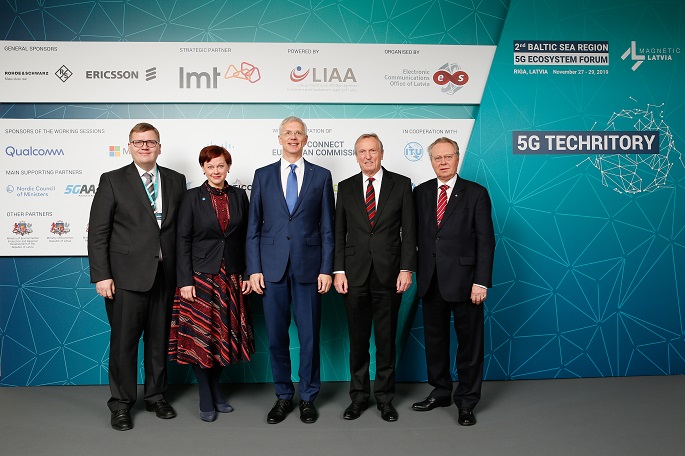2nd 5G Ecosystem Forum opens in Riga
Prioritising privacy, data security emphasized
Published : 29 Nov 2019, 01:13
Updated : 29 Nov 2019, 01:22
Speakers at the 5G Ecosystem Forum on Thursday emphasized to ensure data security and privacy together with developing the 5G network.
“In the European Union we have mandatory issue of data security and we need to address it,” Latvian Prime Minister Krisjanis Karins said while addressing the opening ceremony of the two-day 5G Ecosystem Forum begun in Riga.
Pointing out the perspective of EU, he said that integrated privacy and data security facets into the overall approach to the development of 5G and privacy and data security must be the top priority.
Karins said that it is only when societies and institutions see new technology as trustworthy, that they can unlock their full creative potential.
He viewed that the Baltic countries have to be leaders in the 5G era by introducing the necessary technologies and solutions.
Speaking on the occasion, Paula Lehtomäki, Secretary General of the Nordic Council of Ministers said that Nordic- Baltic cooperation in technological sector is promoting sustainable competition and action must follow to start the Baltic-Nordic cross-border integration for the launch of 5G services.
She, however, said that there are still several challenges that are slowing work on starting cross-border integration and adapting each European country's regulation to a single standard is the most complicated task.
Latvian Environmental Protection and Regional Development Minister Juris Puce termed the 5G forum as the most important conclusions following the meeting of the Nordic and Baltic ministers.
The Forum, was opened with a unique demonstration – for the first time in the region, drone flight BVLOS (beyond the visual line of sight) was conducted on the mobile network, demonstrably switching from one base station to another.
The drone was controlled remotely, by Latvian Mobile Telephone (LMT) president Juris Binde and Prime Minister of Latvia, Krišjānis Kariņš, while the drone was flying within the Adazi airport territory, 25 km away. LMT tests demonstrated that during the entire duration of the flight, the mobile network strength already meets 97.6% of the requirements for successful remote drone management.
“One of the most important issues was how to make 5G metaphorically “fly”. It’s not a matter of building a network, that's the easy part. What is not clear, however, is how to use this network for the needs and purposes of increasing competitiveness, productivity, for business and society,” Juris Binde, President of Latvian Mobile Telephone said.
Drone flights over the mobile network can be used for different industrial purposes. For example, gas and oil pipelines, power supply lines, seaports, which need to be monitored on a regular basis, Binde said, adding ” We can do that with a pre-set track we can send the drones for inspection flights. It’s significantly cheaper and more effective.”
In order to ensure that the use cases will be secure on the mobile network, the network must be tested for higher altitude data usage.
Latvian Mobile Telephone has repeatedly demonstrated a strong mobile network, proven by the ability to offer home smart TV delivered over the mobile network (and gaining two Glomo award nominations for it), while simultaneously being acknowledged by Nokia to be the most efficiently loaded network on the Nokia network. However, the challenge was to test its strength above ground level.
The significance of the demonstration lays in proving the viability of continuing to develop the infrastructure and laws necessary to make drone flight BVLOS a possibility. The experiment demonstrates the safe and predictable flight of remote-controlled drones with automated flightpaths. This will lay the foundation for further research and expansion of use cases first in industrial areas, and later, in smart city applications.
Interest in autonomous drone flight BVLOS has been demonstrated by various LMT clients. For example, LMT is collaborating with the Latvian State Forests, which require the ability to monitor their forests, and practically each flight path would be BVLOS. Their interest lays in the desire to monitor forest growth, illegal deforestation, wildfire monitoring, and monitoring areas experiencing bark beetle infestations, which in recent years has led to significant losses in Europe’s forests. Daily Finland is a media partner of the forum.


